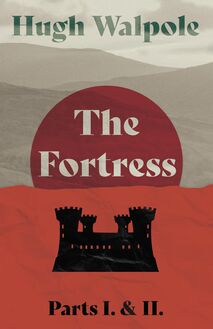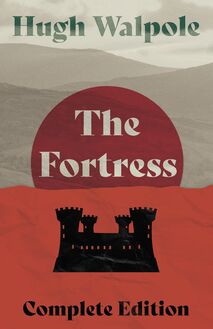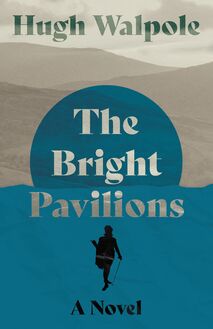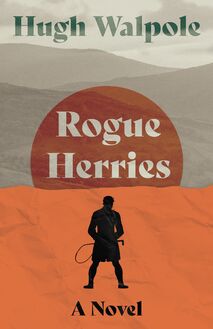-
 Univers
Univers
-
 Ebooks
Ebooks
-
 Livres audio
Livres audio
-
 Presse
Presse
-
 Podcasts
Podcasts
-
 BD
BD
-
 Documents
Documents
-
- Cours
- Révisions
- Ressources pédagogiques
- Sciences de l’éducation
- Manuels scolaires
- Langues
- Travaux de classe
- Annales de BEP
- Etudes supérieures
- Maternelle et primaire
- Fiches de lecture
- Orientation scolaire
- Méthodologie
- Corrigés de devoir
- Annales d’examens et concours
- Annales du bac
- Annales du brevet
- Rapports de stage
La lecture à portée de main
Vous pourrez modifier la taille du texte de cet ouvrage
Découvre YouScribe en t'inscrivant gratuitement
Je m'inscrisDécouvre YouScribe en t'inscrivant gratuitement
Je m'inscrisEn savoir plus
Vous pourrez modifier la taille du texte de cet ouvrage
En savoir plus

Description
The final part of Hugh Walpole’s The Herries Chronicle prequel, this historical romance novel completes the family saga.
First published in 1944, the final book in The Herries Chronicles series aims to bring the period drama to a close. Although the author, Hugh Walpole, passed away before completing the novel, the historical romance ties the saga together.
Katherine Christian has been republished by Read & Co. Books, and should not be missed by lovers of The Herries Chronicles.
Sujets
Informations
| Publié par | Read Books Ltd. |
| Date de parution | 24 août 2022 |
| Nombre de lectures | 0 |
| EAN13 | 9781528797863 |
| Langue | English |
| Poids de l'ouvrage | 1 Mo |
Informations légales : prix de location à la page 0,0000€. Cette information est donnée uniquement à titre indicatif conformément à la législation en vigueur.
Extrait
KATHERINE CHRISTIAN
A NOVEL
By
HUGH WALPOLE
First published in 1944
Copyright © 2022 Read & Co. Classics
This edition is published by Read & Co. Classics, an imprint of Read & Co.
This book is copyright and may not be reproduced or copied in any way without the express permission of the publisher in writing.
British Library Cataloguing-in-Publication Data A catalogue record for this book is available from the British Library.
Read & Co. is part of Read Books Ltd. For more information visit www.readandcobooks.co.uk
Contents
Hugh Walpole
PUBL ISHERS’ NOTE
PART I
THE KING OF STUTTERS
NICHOLAS HERRIES IN HIS HOME
THE MAGICIAN AND HIS LIT TLE DAUGHTER
MUSTE R OF HERRIES
KATHERINE:
BIRTHDAY REMINISCENCE
TWO HALVES OF THE PO ISONED APPLE
THE LAKE
‘THE PEACOC K HAS FLOWN’
BIRTH OF AN IMPORTANT MEMBER OF THE HE RRIES FAMILY
PART II
DEDICATION OF THE HEART
TH IS MY MASTER
THE FLAME S ARE HIDDEN
PORTRAIT OF THE KING
KATHERI NE AT SEDDON
PETER AND HI S CONFESSION
LUCY I N CUMBERLAND
THE MOON IS DARKENED
NICHOLAS SEES THE SUN
PART III
KINSMEN AT WAR
THE BETRAYAL
THE BETRAYED
THE ROCKS
CROMWELL: FLA ME AND CLOUD
BRAVE BANNER S AT MALLORY
Hugh Walpole
Hugh Seymour Walpole was born in Auckland, New Zealand in 1884. He was educated at a series of boarding schools in England, followed by Emmanuel College, Cambridge. Walpole’s father hoped he would follow him into the clergy, but after three years as a missionary, in 1909, Walpole resolved to become a man of letters. His first commercial success came in 1911 with the novel Mr Perrin and Mr. Traill , after which Walpole made the acquaintance of writers such as Henry James and Joseph Conrad, and declared his ambition to become the greatest writer of his era. For the rest of his life, Walpole wrote prolifically. During the twenties he produced more than a novel a year, with The Cathedral (1922) and Wintersmoon (1928) proving to be great successes. In 1930, he began his most popular series of novels with the historical romance Rogue Herries , following it with Judith Paris (1931), The Fortress (1932) and Vanessa (1933). Eventually, he amassed an oeuvre of 36 novels, five volumes of short stories, two plays and three volumes of memoirs. He died in 1941, aged 57. Despite the fact that Walpole sold enormously well on both sides of the Atlantic, and was praised by many of his contemporaries, he is somewhat forgotten now, in part because he was overshadowed by P. G. Wodehouse and others.
PUBLISHERS’ NOTE
In his foreword to the collected volume of The Herries Chronicle (1939), Sir Hugh Walpole wrote: “In the middle of the last war, sitting in the mud in trenches near the Carpathians, I comforted my soul with visions of an English Chronicle that would stretch, without break, from the days of Elizabeth to our modern time. The half of that ambition is accomplished, and I hope, if my life is spared, to fulfil the rest of it.”
The Bright Pavilions (1940) carried the idea one stage nearer fulfilment. The story of Katherine Christian begins where The Bright Pavilions left off, and Sir Hugh worked on it until his death. The last page of manuscript is dated 24th May, 1941, and he died suddenly on 1st June. He did not leave any notes or other indications of the conclusion of the plot.
His literary executors feel, however, that Katherine Christian , although not quite completed, is sufficiently well rounded to be given to the public as the last novel in the Herrie s Chronicle.
PART I
THE KING OF STUTTERS
NICHOLAS HERRIES IN HIS HOME
Robert Herries looked up, staggered to his feet and, chuckling, started across the floor towards his father.
Nicholas Herries, his father, and Rosamund Herries, his mother, looked at him with love and pride. Nicholas, a vast man, was in this year 1603 fifty-nine years of age and his wife t hirty-seven.
They were in their own house at Westminster and all was very well with them. Robert, their only child, was now three years of age. In build he was broad and well-formed but short, his sturdy legs strong on the ground, his round head well set on his thick neck, his eyes steady a nd piercing.
He was still a baby but already he had self-confidence and independence. He was a grave baby now: he chuckled only when his father was at hand. Everything that was told to him, the rhymes that his mother sang to him, the cautions and admonitions that Mrs. Margit, his nurse, gave to him—all these he took in and remembered.
Already it was facts that he liked the best; his mind wandered at fairy-stories. Any tale that he was told must be well substantiated. That was perhaps the reason that his father meant more to him than any other in his world, for there was no doubt or question about his father, so large was he and solid, so strong in the arm, and when he held his son against his breast the thumping of his heart was like the reassurance of a great b eating drum.
Already Robert felt safe against any sort of peril if his father were there. But he was not in any case a nervous baby and he had already a firm preponderance of the Herries matter-of-fact common sense. Facts indeed were facts and it was already his rule of life to go by what you could see, feel, hold and even seize. And what he seized he held. At this present he was holding what was just then his favourite possession—a Fool with silver bells, a red cap and a great hooked nose. As he crossed the shining parlour floor to his father he held the Fool tightly in his chubby fist and the bells car olled gaily.
Nicholas had been almost asleep, for he had had a hard day that had included a visit to the Queen. Then the fire was blazing finely in the open hearth, throwing its erratic lights on the colours of dark green, gold, and brilliant blue that Rosamund was working into h er tapestry.
Nicholas had been almost dreaming—dreaming about his long life and the principal scenes in it, of the girl Catherine he had loved who had given her life for him, of his dear brother Robin who had been tortured to his death in the Tower, and after that of England that he loved so dearly. He had come to full awareness with a start, crying: ‘England is a lovely place: I would have no other.’ And then, realizing his son, he had stretched out his great arms: ‘Come, Robin—come!’
At once Robin had started across the floor. They had given him this pet name after his beloved uncle, but he did not hesitate, as his uncle would have done, seeing both sides of the argument. He saw only one—that he liked above all things his father’s arms, their warmth and strength and per fect safety.
So he started at once across the floor, the red-capped Fool, with his proud nose, held captive in his fist.
Nicholas picked him up, carried him to his mother who kissed him, then he took him from the room high on h is shoulder.
Later Nicholas returned and stood, his legs spread, warming his back before the fire. Rosamund asked him abou t the Queen.
‘She can live but a little time. Indeed she is already dead. That old woman, seated on the floor rolling her head from side to side, is nothing. Her greatness has flown to the skies where it belongs fo r all time.’
‘And so it will be James o f Scotland.’
‘Yes. They say strange things of him. He is a scholar, a great Latinist, but has superstitions like an old dame of the village. He is resolute and unresolute. Avaricious and generous. And his m oralities——’
‘His moralities?’ she asked, laughin g up at him.
‘Are not for la dies’ ears.’
She gathered up h er tapestry.
‘I must go to Robin.’ As she passed him she kissed his cheek—‘Ladies’ ears have a wider compass than men can fancy. I have heard—thi s and that.’
In the early morning of March 24th, he was lying in the big four-poster with his wife and very fast asleep. He woke as though someone had tapped him on the shoulder. Rosamund’s hand was lightly on his left breast and, very gently, he removed it. What had disturbed him? Moving his big body with great care lest he should rouse her, he sat up a nd listened.
There was no sound except the wind teasing outside the window. He stayed there, bothered by the little worrying thoughts that come to every wakeful man in the middle of the night—thoughts about Mallory, a new gardener he had who was one of these Puritans, always preaching to the other servants and rebuking them for pleasures that seemed to Nicholas most natural and wholesome, thoughts about moneys and whether he should buy those two new fields towards the far paddock—but thoughts especially about the plague. There were signs already that it would be returning this summer and, if a hot summer, it would be a bad case. Had he better now, before April, move with Rosamund and Robin to Mallory? There was nothing to keep him in the town, and although he loved his Westminster house, he loved Mallory yet more. He thought of a play that he had seen three nights back by that bawdy fellow Ben Jonson, and then, with that, the bore that a week ago at dinner Lord Henry Howard had been with his long-drawn-out complaint against the fellow because Jonson had struck one of h is servants.
He stretched his arms and yawned. He scratched his chest. None of these was the real matter. There was something further. He dropped his naked feet on to the floor, stood up and moved gingerly to where was his furred gown. He turned and listened. Rosamund slept sweetly. Moving with great gentleness for so vast a man, yawning again and scratching his head, he unlatched the door and crossed into the little room where he kept his large globe and his maps. Like every gentleman of his time he was deeply interested in the foreign adventures of his countr
-
 Univers
Univers
-
 Ebooks
Ebooks
-
 Livres audio
Livres audio
-
 Presse
Presse
-
 Podcasts
Podcasts
-
 BD
BD
-
 Documents
Documents
-
Jeunesse
-
Littérature
-
Ressources professionnelles
-
Santé et bien-être
-
Savoirs
-
Education
-
Loisirs et hobbies
-
Art, musique et cinéma
-
Actualité et débat de société
-
Jeunesse
-
Littérature
-
Ressources professionnelles
-
Santé et bien-être
-
Savoirs
-
Education
-
Loisirs et hobbies
-
Art, musique et cinéma
-
Actualité et débat de société
-
Actualités
-
Lifestyle
-
Presse jeunesse
-
Presse professionnelle
-
Pratique
-
Presse sportive
-
Presse internationale
-
Culture & Médias
-
Action et Aventures
-
Science-fiction et Fantasy
-
Société
-
Jeunesse
-
Littérature
-
Ressources professionnelles
-
Santé et bien-être
-
Savoirs
-
Education
-
Loisirs et hobbies
-
Art, musique et cinéma
-
Actualité et débat de société
- Cours
- Révisions
- Ressources pédagogiques
- Sciences de l’éducation
- Manuels scolaires
- Langues
- Travaux de classe
- Annales de BEP
- Etudes supérieures
- Maternelle et primaire
- Fiches de lecture
- Orientation scolaire
- Méthodologie
- Corrigés de devoir
- Annales d’examens et concours
- Annales du bac
- Annales du brevet
- Rapports de stage














